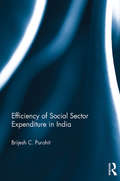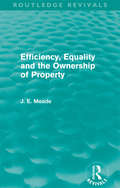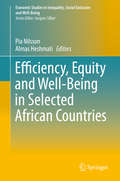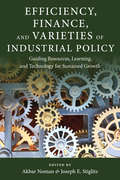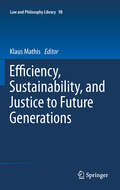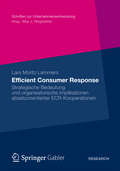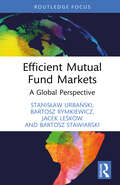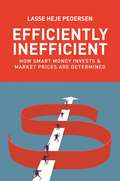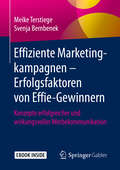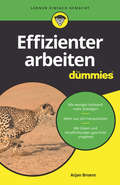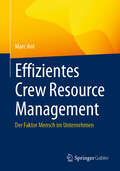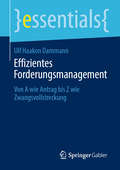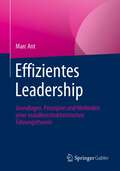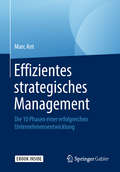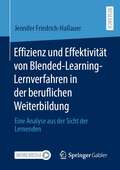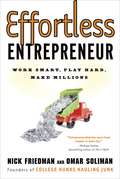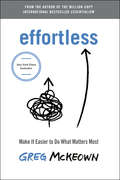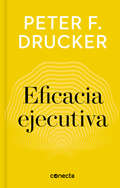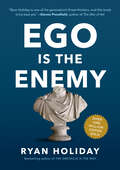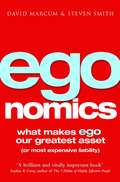- Table View
- List View
Efficiency of Social Sector Expenditure in India
by Brijesh C PurohitGovernment investments in social sector has always played an important role in tackling social issues and facilitated in the alleviation of poverty. Hence, budgetary expenditure to be mobilized for such investments needs to be efficiently allocated and utilized to maximize the greatest good. This book focuses on the social sector in India and provides an overview of the sector. The book looks at 15 major Indian states between the year 2000-2011 to see how these states had invested in social sector and whether they had met the criteria of efficient social sector investment. Using stochastic frontier models, the book provides an efficiency norm and making use of this normative estimate, it compares performance across 15 Indian states and suggests important policy implications to improve the future performance of the social sector. The book adopts various quantitative techniques in the analysis and establishes that inefficient and inappropriate allocation of inputs was made in both health and education sectors. The book suggests that such problems and future challenges could be overcome by an appropriate mix of emphasis in different activities. This book will provide insight for those who want to learn more about how to build the capacity of the social sector in more efficient manner by exploring the social sector of India.
Efficiency, Equality and the Ownership of Property (Collected Works of James Meade)
by James E. MeadeFirst published in 1964, this is a study of the extreme inequalities in the ownership of property, in economies across the globe. Professor Meade examines in depth the economic, demographic and social factors which lead to such inequalities. He considers a wide range of remedial policies – educational development, reformed death duties and capital taxes, demographic policies, trade union action, the socialization of property, the development of a property-owning democracy, the expansion of the welfare state. The argument is expressed in precise analytical terms, but the main exposition is free of mathematics and technical jargon and is designed for the interested layman as well as the economist.
Efficiency, Equity and Well-Being in Selected African Countries (Economic Studies in Inequality, Social Exclusion and Well-Being)
by Pia Nilsson Almas HeshmatiThis book addresses poverty and well-being, equity, and efficiency in selected African countries. The chapters focus on three main topics: studies in the measurement and analysis of well-being and vulnerability to poverty, women's empowerment, and the dynamics and determinants of income and efficiency among smallholders. The chapters in the first section examine poverty, well-being, and vulnerability to poverty, as well as social exclusion, with a focus on households in Ethiopia, Rwanda, and Tanzania. They highlight the need to consider multidimensional measures of well-being and vulnerability to poverty, the need to address the distribution of vulnerability across different segments of the population, as well as the importance of developing public policies aimed at poverty reduction and promoting the well-being of the poor. The next section deals with issues related to women’s empowerment, including a multidimensional case study of women’s empowerment in Ghana and women’s access to microfinance services in Ethiopia. The final section focuses on dynamics and determinants of income and efficiency among farm households in Ethiopia and Uganda. Using a variety of methodologies, this volume provides a multifaceted approach to studying poverty and well-being in a diverse range of locations. As such, it of use to undergraduate and graduate students studying African economics or economics of poverty and well-being, and will be appealing to public policymakers and international aid agencies.
Efficiency, Finance, and Varieties of Industrial Policy
by Joseph E. Stiglitz Akbar NomanIndustrial policy, once relegated to resource allocation, technological improvements, and the modernization of industries, should be treated as a serious component of sustainability and developmental economics. A rich set of complimentary institutions, shared behavioral norms, and public policies have sustained economic growth from Britain's industrial revolution onwards. This volume revisits the role of industrial policy in the success of these strategies and what it can offer developed and developing economies today.Featuring essays from experts invested in the expansion of industrial policies, topics discussed include the most effective use of industrial policies in learning economies, development finance, and promoting investment in regional and global contexts. Also included are in-depth case studies of Japan and India's experience with industrial policy in the banking and private sector. One essay revisits the theoretical and conceptual foundations of industrial policy from a structural economics perspective and another describes the models, packages, and transformation cycles that constitute a variety of approaches to implementation. The collection concludes with industrial strategies for facilitating quality growth, realizing more sustainable manufacturing development, and encouraging countries to industrialize around their natural resources.
Efficiency, Finance, and Varieties of Industrial Policy: Guiding Resources, Learning, and Technology for Sustained Growth (Initiative for Policy Dialogue at Columbia: Challenges in Development and Globalization)
by Stiglitz Joseph E. Noman AkbarIndustrial policy, once relegated to resource allocation, technological improvements, and the modernization of industries, should be treated as a serious component of sustainability and developmental economics. A rich set of complimentary institutions, shared behavioral norms, and public policies have sustained economic growth from Britain's industrial revolution onwards. This volume revisits the role of industrial policy in the success of these strategies and what it can offer developed and developing economies today. Featuring essays from experts invested in the expansion of industrial policies, topics discussed include the most effective use of industrial policies in learning economies, development finance, and promoting investment in regional and global contexts. Also included are in-depth case studies of Japan and India's experience with industrial policy in the banking and private sector. One essay revisits the theoretical and conceptual foundations of industrial policy from a structural economics perspective and another describes the models, packages, and transformation cycles that constitute a variety of approaches to implementation. The collection concludes with industrial strategies for facilitating quality growth, realizing more sustainable manufacturing development, and encouraging countries to industrialize around their natural resources.
Efficiency, Sustainability, and Justice to Future Generations
by Klaus MathisFifty years after the famous essay "The Problem of Social Cost" (1960) by the Nobel laureate Ronald Coase, Law and Economics seems to have become the lingua franca of American jurisprudence, and although its influence on European jurisprudence is only moderate by comparison, it has also gained popularity in Europe. A highly influential publication of a different nature was the Brundtland Report (1987), which extended the concept of sustainability from forestry to the whole of the economy and society. According to this report, development is sustainable when it "meets the needs of the present without compromising the ability of future generations to meet their own needs". A key requirement of sustainable development is justice to future generations. It is still a matter of fact that the law as well as the theories of justice are generally restricted to the resolution of conflicts between contemporaries and between people living in the same country. This in turn raises a number of questions: what is the philosophical justification for intergenerational justice? What bearing does sustainability have on the efficiency principle? How do we put a policy of sustainability into practice, and what is the role of the law in doing so? The present volume is devoted to these questions. In Part One, "Law and Economics", the role of economic analysis and efficiency in law is examined more closely. Part Two, "Law and Sustainability", engages with the themes of sustainable development and justice to future generations. Finally, Part Three, "Law, Economics and Sustainability", addresses the interrelationships between the different aspects.
Efficient Consumer Response
by Lars Moritz LammersHerausarbeitung der strategischen Bedeutung absatzgerichteter ECR-Kooperation sowie Entwicklung theoretisch-konzeptioneller Ansatzpunkte zur strukturellen und phasenspezifischen Gestaltung eines herstellergerichteten ECR-Beziehungsmanagements, um vor dem Hintergrund der aktuellen Entwicklungen und der beziehungsinhärenten Konflikte Gestaltungshinweise zu entwickeln, wie strategische Zielsetzungen im Rahmen von ECR-Partnerschaften realisiert werden können.
Efficient Mutual Fund Markets: A Global Perspective (Routledge Focus on Economics and Finance)
by Jacek Leśkow Stanisław Urbański Bartosz Rymkiewicz Bartosz StawiarskiThis book covers a new and innovative approach to the issue of investment portfolio efficiency from the perspective of a large institutional investor. It discusses the challenges relating to changes in returns on the international stock market, with particular emphasis on investments.Instead of focusing on just one designated market, the book examines four diversified, developed markets, and models the Polish market as a representative of emerging markets. The authors argue that the current market for available financial instruments, mainly derivatives, may be an example of a partially complete market. With such assumptions, they test selected markets, assuming that a representative investor, such as an investment fund, makes rational decisions and uses all available financial instruments. The research conducted in the book is unique in its assumption that investors form portfolios that consider the structure of the company's financial results. The significant impact that the financial crisis in the United States since 2007, the COVID-19 pandemic, and Russia's aggression against Ukraine have had on investors' decisions is also discussed.The book will find an audience among researchers, scholars, and students specialising in finance and capital market investments.
Efficiently Inefficient: How Smart Money Invests and Market Prices Are Determined
by Lasse Heje PedersenEfficiently Inefficient describes the key trading strategies used by hedge funds and demystifies the secret world of active investing. Leading financial economist Lasse Heje Pedersen combines the latest research with real-world examples and interviews with top hedge fund managers to show how certain trading strategies make money--and why they sometimes don't. Pedersen views markets as neither perfectly efficient nor completely inefficient. Rather, they are inefficient enough that money managers can be compensated for their costs through the profits of their trading strategies and efficient enough that the profits after costs do not encourage additional active investing. Understanding how to trade in this efficiently inefficient market provides a new, engaging way to learn finance. Pedersen analyzes how the market price of stocks and bonds can differ from the model price, leading to new perspectives on the relationship between trading results and finance theory. He explores several different areas in depth--fundamental tools for investment management, equity strategies, macro strategies, and arbitrage strategies--and he looks at such diverse topics as portfolio choice, risk management, equity valuation, and yield curve logic. The book's strategies are illuminated further by interviews with leading hedge fund managers: Lee Ainslie, Cliff Asness, Jim Chanos, Ken Griffin, David Harding, John Paulson, Myron Scholes, and George Soros. Efficiently Inefficient effectively demonstrates how financial markets really work.Free problem sets are available online at http://www.lhpedersen.com
Effiziente Krisenkommunikation – transparent und authentisch: Wie Kommunikation in extremen Situationen heute aussehen muss, um Organisationen zukunftsfähig zu machen
by Susanne Bachmann Anabel Ternès von HattburgDieses Buch erklärt anhand konkreter Beispiele das Entstehen einer Krise, wie man ihr vorbeugen und wie man sie zum eigenen Vorteil bzw. zum Vorteil des Unternehmens nutzen kann. Die Autorinnen erläutern, wie man sich mit Krisenpotenzialen auseinandersetzt und sich darauf vorbereitet, im Fall einer Krise oder eines Shitstorms transparent und authentisch zu handeln. Praktische Checklisten sowie Tipps und Tricks unter Berücksichtigung der neuesten technologischen Möglichkeiten ergänzen das Buch. Die 2. Auflage wurde überarbeitet und erweitert. Neben einem Geleitwort der ehemaligen Marketingchefin der Deutschen Bahn, Antje Neubauer, sind Kapitel zu den Themen „Kommunikation in der Corona-Krise“ und „virtuelle Meetings“ hinzugekommen sowie ein Interview mit dem international renommierten Krisenmanager Uwe Wolff.
Effiziente Marketingkampagnen – Erfolgsfaktoren von Effie-Gewinnern: Konzepte erfolgreicher und wirkungsvoller Werbekommunikation
by Meike Terstiege Svenja BembenekDieses Buch identifiziert und erläutert zwölf Werbewirkungsfaktoren, die nachweislich einen entscheidenden Einfluss auf den Erfolg und die Effizienz von Werbekampagnen und Marketingkommunikation haben. Dafür wurden mehr als Tausend eingereichte Effie-Werbekampagnen der letzten 36 Jahre analysiert, und die Erfolgsfaktoren wurden jeweils nach Unternehmens- versus Verbraucherperspektive der Werbekampagnen unterteilt und betrachtet. Die Ergebnisse geben Aufschluss darüber, welche Erfolgsfaktoren den Erfolg und die Effizienz signifikant beeinflussen – und somit die Chance auf einen Effie-Preis erhöhen. Zudem werden konkrete Handlungsempfehlungen hinsichtlich der Gestaltung einer effizienten Werbekampagne gegeben, und anhand eines Leitfragebogens werden konkrete Möglichkeiten zur Implementierung aufgezeigt.
Effizienter arbeiten für Dummies (Für Dummies)
by Arjan BroereZu viel zu tun und zu wenig Zeit? Effizient arbeiten ist in der heutigen Arbeit- und Lebenswelt eine wichtige Fähigkeit, die es zu beherrschen gilt. Sie wollen Ihre Arbeit, Ihren Tagesablauf, aber auch Ihre Gedanken besser organisieren? Sie wollen Ihren Kopf frei haben für Wichtiges und dabei keine Aufgaben vergessen? Dieses Buch hilft Ihnen dabei. Lernen Sie die Getting Things Done-Methode kennen und lassen Sie sich vom Autor zeigen, wie Sie sich ein effizientes Leben ermöglichen und jeden Tag zu einem idealen Tag machen. Managen Sie sich und Ihre Zeit selbst.
Effizientes Crew Resource Management: Der Faktor Mensch im Unternehmen
by Marc AntDas Buch stellt theoretisch fundierte und praxisnahe Methoden und Vorgehensweisen vor, die es den Menschen in Unternehmen durch veränderte Denk-, Verhaltens- und Handlungsweisen erlauben, die sie umgebende Komplexität und die damit verbundenen Fehlleistungen und Sicherheitsrisiken zu managen und zu reduzieren und andererseits ihre individuelle und kollektive Effizienz und Leistungsfähigkeit zu optimieren. Der Autor greift dabei auf das ursprünglich aus der Luftfahrtindustrie stammende Konzept des effizienten Crew Resource Managements zurück und überträgt dieses auf die Realität von Organisationen und Unternehmen. Es geht somit um die Frage, inwiefern der Mensch in einer Institution, einer Organisation oder einem Unternehmen in seinem Denken, Verhalten und Handeln optimiert werden kann, indem er sich seiner eigenen Potenziale und Funktionsweisen bewusst wird, seine Grenzen und Unzulänglichkeiten erkennt und entsprechende kurz-, mittel- und längerfristige Maßnahmen vorbereitet und einleitet, um sowohl ein effizientes Denken, Verhalten und Handeln ein- und auszuüben als auch Gefahren, Unfälle und Katastrophen auf ein Minimum zu reduzieren. Zahlreiche Beispiele, Übungen und Checklisten dienen Fach- und Führungskräften als Denkanstöße für die eigene Reflexion und helfen dabei, neue Methoden zu entwickeln und in ihrer alltäglichen beruflichen Praxis bewusst und systematisch anzuwenden
Effizientes Forderungsmanagement: Von A wie Antrag bis Z wie Zwangsvollstreckung (essentials)
by Ulf Haakon DammannUlf Haakon Dammann stellt den Umgang mit mangelnder Zahlungsmoral im täglichen Geschäftsverkehr übersichtlich und kompakt vor. Schnell gewinnt der Leser einen Überblick über mögliche und erforderliche Schritte, um zu seinem Recht zu kommen und die Leistung eines säumigen Schuldners zu erwirken.Der Autor:Dipl.-Jur. Ulf Haakon Dammann ist freiberuflicher Dozent und Bildungsreferent in der Erstausbildung für Pflegeberufe sowie in der Fortbildung für Ärzte.
Effizientes Leadership: Grundlagen, Prinzipien und Methoden einer sozialkonstruktivistischen Führungstheorie
by Marc AntDas Buch beschreibt theoretisch fundiert sowie praxisorientiert das Thema Leadership und stellt neben den klassischen Grundlagen und Führungstheorien insbesondere die sozialkonstruktivistische Leadershiptheorie vor. Der Autor gibt unter anderem Antworten auf die Fragen: Was ist Leadership? Wie kann man dieses Phänomen definieren und verstehen? Welche Erkenntnisse können aus einer historischen Betrachtung des Leaderships gewonnen werden? Welche ökonomischen, soziologischen und psychologischen Prozesse tragen zur Entstehung eines zeitgemäßen Leaderships bei? Wie kann ein erfolgreiches, bzw. ein weniger erfolgreiches Leadership charakterisiert werden? Auf welche Art und Weise kann man Leadership erlernen?Nach einer inhaltlichen Einordnung des Themas werden die klassischen Führungstheorien kritisch betrachtet und die sozialkonstruktivistische Leadershiptheorie, -prinzipien und -methoden näher beleuchtet. Abschließend analysiert der Autor ausgewählte Spielfilme durch die Brille der Leadershiptheorien und leitet daraus anhand einer interaktiven Vorgehensweise Erkenntnisse für die persönliche und unternehmerische Führungspraxis ab.
Effizientes strategisches Management: Die 10 Phasen einer erfolgreichen Unternehmensentwicklung
by Marc AntDas Buch stellt ein praxisorientiertes 10-Phasen-Modell des strategischen Managements vor, das auf dem theoretischen Konzept des Sozialkonstruktivismus aufbaut. Ziel des Modells ist es, durch Analyse, Planung, koordinierte Umsetzung und Evaluation von Projekten die Komplexität, der sich Unternehmen heute ausgesetzt sehen, zu reduzieren und sie beherrschen zu können.Anhand des Beispiels einer Hochschulgründung wird die praktische Umsetzung des 10-Phasen-Modells veranschaulicht. Vorgestellt werden auch in der Praxis erprobte und wissenschaftlich validierte Instrumente des strategischen Managements, die ebenfalls zur erfolgreichen Konzeption und Umsetzung einer Unternehmensstrategie beitragen.Ein ausführliches Projekthandbuch zeigt zudem, wie Führungskräfte das 10-Phasen-Modell unkompliziert in einen unternehmerischen Strategieprozess integrieren können.
Effizienz und Effektivität von Blended-Learning-Lernverfahren in der beruflichen Weiterbildung: Eine Analyse aus der Sicht der Lernenden
by Jennifer Friedrich-HaßauerDie Ausgangslage dieser Analyse sind unterschiedliche Lernverfahren in der beruflichen Weiterbildung in Deutschland. Untersucht wird, wie diese sich auf den Lernerfolg der Lernenden auswirken. Es gilt, den Zielkonflikt zwischen den Anforderungen der Teilnehmenden und den Angeboten der Weiterbildungsanbieter zu lösen. Eine wesentliche Aufgabe ist es, die Lerntypen der Lernenden zu ermitteln und sich auf dieser Basis geeignete Lernverfahren zu erarbeiten. Daraus wird die Forschungsfrage abgeleitet, wie effizient und effektiv Blended-Learning-Lernverfahren sind und wie diese sich im Lernprozess auf den Lernerfolg auswirken. Das Ergebnis spiegelt sich in einer Empfehlung von Lernverfahren wider, die sich als effizient und effektiv aus der Sicht der Lernenden unter Berücksichtigung der jeweiligen Einflussfaktoren erweisen.
Effizienz- und Leistungserhöhung durch Tagesstrukturierung: Wie Sie mit disziplinierter Selbststrukturierung noch erfolgreicher werden (essentials)
by Quirin Graf Adelmann v. A. Florian LöhleinDieses Buch ist eine Anleitung zur Selbstorganisation für Führungskräfte und Unternehmer. Basierend auf den Erfahrungen eigener zahlreicher Unternehmen beschreiben die Autoren, wie Sie Ihren Alltag effizient gestalten und Ihre Leistung verbessern.Mit Hilfe des beschriebenen Vorgehens können Sie den steigenden Herausforderungen selbst in Zeiten intensiver Belastung begegnen, ohne sich körperlich oder geistig zu überlasten. Sie erfahren, wie Sie sich einen freien Kopf für strategische Überlegungen schaffen, indem Sie Ihre Arbeitsbelastung reduzieren, Termindruck vermeiden und das Aufschieben von Aufgaben verhindern.
Effortless Entrepreneur: Work Smart, Play Hard, Make Millions
by Michael Gerber Daylle Deanna Schwartz Nick Friedman Omar SolimanNick Friedman and Omar Soliman started the multimillion-dollar franchise College Hunks Hauling Junk when they were just twenty two, and they've been having the time of their lives ever since. What's their secret? That's just it--there isn't one. There's no fancy software or complicated business schemes. No outside investors or quirky market niche. They just followed 10 common-sense commandments to building a straightforward, fun, and successful business that does a simple job well. Anyone can understand it, and anyone can do it. From the Trade Paperback edition.
Effortless: Make It Easier to Do What Matters Most
by Greg McKeownFrom the New York Times bestselling author of the million-copy bestseller Essentialism comes an empowering guide to achieving your goals. It all starts with a simple principle: Not everything has to be so hard. &“In a world beset by burnout, Greg McKeown&’s work is essential.&”—Daniel H. Pink, author of When, Drive, and To Sell Is Human &“At a time when fear, uncertainty, and our ever-growing list of responsibilities have come to feel like much too much to handle, Effortless couldn&’t be timelier, or more necessary.&”—Eve Rodsky, author of Fair PlayDo you ever feel like:• You&’re teetering right on the edge of burnout?• You want to make a higher contribution, but lack the energy? • You&’re running faster but not moving closer to your goals? • Everything is so much harder than it used to be? As high achievers, we&’ve been conditioned to believe that the path to success is paved with relentless work. That if we want to overachieve, we have to overexert, overthink, and overdo. That if we aren&’t perpetually exhausted, we&’re not doing enough. But lately, working hard is more exhausting than ever. And the more depleted we get, the more effort it takes to make progress. Stuck in an endless loop of &“Zoom, eat, sleep, repeat,&” we&’re often working twice as hard to achieve half as much. Getting ahead doesn&’t have to be as hard as we make it. No matter what challenges or obstacles we face, there is a better way: instead of pushing ourselves harder, we can find an easier path. Effortless offers actionable advice for making the most essential activities the easiest ones, so you can achieve the results you want, without burning out. Effortless teaches you how to:• Turn tedious tasks into enjoyable rituals • Prevent frustration by solving problems before they arise • Set a sustainable pace instead of powering through • Make one-time choices that eliminate many future decisions • Simplify your processes by removing unnecessary steps• Make relationships easier to maintain and manage• And much more The effortless way isn't the lazy way. It's the smart way. It may even be the only way. Not every hard thing in life can be made easy. But we can make it easier to do more of what matters most.
Eficacia ejecutiva (Imprescindibles)
by Peter F. Drucker<P>La historia nos resulta familiar: una empresa que era una superestrella hasta ayer se halla en apuros o sumida en una crisis aparentemente ingobernable. El origen de casi todas esas crisis no es que las cosas se estén haciendo mal. De hecho, en la mayoría de los casos se está haciendo lo correcto, pero sin resultados. ¿Qué explica esta aparente paradoja? <P>Las suposiciones sobre las cuales se ha construido y se gestiona la organización ya no funcionan. Esas suposiciones son lo que Drucker denomina «teoría del negocio», y explican tanto los éxitos de las empresas que han dominado la economía como los desafíos a los que hanhecho frente. Y ¿qué te convierte en un líder eficaz? <P>El liderazgo no es cuestión de personalidad o de talento. Los mejores líderes hacen gala de actitudes y valores dispares. Pero todos tienen en común que hacen las cosas correctas de la manera adecuada aplicando sencillas reglas que proporcionan el conocimiento necesario para tomar decisiones inteligentes, convertir ese conocimiento en acciones eficaces y fomentar la responsabilidad en toda la organización. <P>Los «Imprescindibles» de Conecta, en colaboración con Harvard Business Review, permiten acceder a las grandes ideas de los autores de referencia que inspiran a directivos y profesionales. Este volumen reúne los textos «Teoría del negocio» y «¿Qué te convierte en un líder eficaz?» de Peter F. Drucker (1909-2005), cuyas obras -como El ejecutivo eficaz o El management del futuro- y su pensamiento son referentes en la gestión empresarial. La crítica ha dicho...Reseñas:El Jurado ha dicho:Los blogueros opinan...Los lectores comentan...Críticas:
Egghead to Egghead.com (A)
by V. Kasturi Rangan Marie BellOver the course of 12 months in 1997 and 1998, Egghead senior management decided to shut down its 180 brick-and-mortar retail stores and move to an electronic store. The case describes the evolution of that process, and the role of its CEO George Orban, and poses questions on the company's future viability.
Ego Is the Enemy: The Fight To Master Our Greatest Opponent
by Ryan Holiday"While the history books are filled with tales of obsessive visionary geniuses who remade the world in their image with sheer, almost irrational force, I've found that history is also made by individuals who fought their egos at every turn, who eschewed the spotlight, and who put their higher goals above their desire for recognition." --from the prologue Many of us insist the main impediment to a full, successful life is the outside world. In fact, the most common enemy lies within: our ego. Early in our careers, it impedes learning and the cultivation of talent. With success, it can blind us to our faults and sow future problems. In failure, it magnifies each blow and makes recovery more difficult. At every stage, ego holds us back. Ego Is the Enemy draws on a vast array of stories and examples, from literature to philosophy to history. We meet fascinating figures such as George Marshall, Jackie Robinson, Katharine Graham, Bill Belichick, and Eleanor Roosevelt, who all reached the highest levels of power and success by conquering their own egos. Their strategies and tactics can be ours as well. In an era that glorifies social media, reality TV, and other forms of shameless self-promotion, the battle against ego must be fought on many fronts. Armed with the lessons in this book, as Holiday writes, "you will be less invested in the story you tell about your own specialness, and as a result, you will be liberated to accomplish the world-changing work you've set out to achieve."From the Hardcover edition.
Egonomics
by Steven Smith Dave MarcumBacked by five years of research, David Marcum and Steven Smith's egonomics informs readers that the key to great leadership is understanding exactly what ego is - and what it should not be.With the aid of real-life examples and persuasive writing, egonomics argues that while most people believe ego is negative, it is actually a healthy, necessary element to management effectiveness and business leadership. Marcum and Smith illustrate that the distinction between a good and a great leader is how humility affects their ambition, and egonomics is full of ideas that help both upper and middle management keep their egos in balance. With a compelling combination of business and psychology expertise, these two specialists explain how (a) being too competitive can make you less competitive, (b) seeking respect and recognition dilutes effectiveness and (c) humility, curiosity and veracity are the essential components to outstanding leadership. Full of the best advice from the experts in the field, egonomics is poised to be the blockbuster business bestseller of the season.
